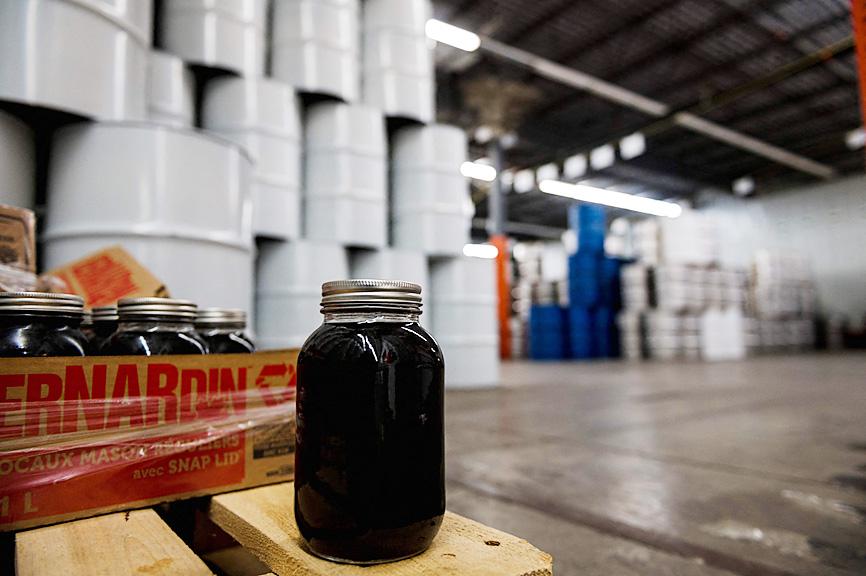Pancake lovers, fear not. Strong demand for maple syrup after a poor Canadian harvest has created supply-side woes, but Quebec province is tapping its strategic reserves to keep the world awash in the sweet, sticky stuff.
Experts are warning that the shortages could be further compounded by climate change, which is already being blamed for last spring’s shorter and warmer sugaring season.
To avoid shortages, the Quebec Maple Syrup Producers said it has released more than half of its stockpile of syrup.

Photo: AFP
“It’s normal, that’s what we want: The reserves must be the buffer between temperature, demand and production,” organization president Serge Beaulieu said.
Quebec makes almost three-quarters of the world’s supply, and the organization — sometimes called the OPEC of maple syrup — represents more than 11,000 producers.
The group’s massive reserves in the town of Laurierville, near Quebec City, are emblematic of Canada’s hugely lucrative maple syrup industry.
Housed in a warehouse the size of five football fields, tens of thousands of barrels, each containing 205 liters, are stacked row upon row, up to the ceiling.
In Canada, maple syrup is serious business. Often called “Quebec gold” in the region, it sometimes has been treated more like gold itself.
During the “Great Canadian Maple Syrup Heist” a decade ago, thieves stole C$18.7 million (US$14.5 million at the current exchange rate) worth of maple syrup from the facility.
However, at present, the only siphoning is to relieve market shortages: At the start of the year, about 105 million pounds (47.6 million kilograms) were stored there. The stockpile has since been whittled down to only 37 million pounds.
The sap harvest usually starts in March, when temperatures are above freezing during the day, but below 0°C overnight.
Harvesters traditionally hammered spiles into tree trunks and let the sap drip into buckets, but now collect it from multiple trees at once through a system of tubing, for refining.
Producer Laurie Larouche, 23, told reporters that “last spring was cut short because it got hotter faster than usual so instead of having a good month of harvest we had perhaps only two weeks plus a few days here and there.”
“We produced 50 percent less syrup” this year, Maryse Nault said, as she trudged through the snow to inspect spiles in trees on her farm in Saint-Marc-sur-Richelieu, 50km east of Montreal.
The province’s total yield fell to 133 million pounds of maple syrup, about 20 to 40 pounds less than in four of the previous five years, according to the producer cartel’s data, and far short of the 175 million pounds sold last year.
Researchers at the Quebec Ministry of Forests have concluded that the yield per maple tree could fall by as much as 15 percent by 2050, due mostly to increasingly warm weather in the month of April.
Meanwhile, sales have doubled over the past decade, including a 20 percent jump in just the first six months of this year compared with the same period the previous year.
Due to this rising demand, which has occurred both domestically and in key export markets such as the US, Germany and Japan, producers have been authorized by the province’s maple syrup federation to tap 7 million additional trees over the next three years, bringing the total to 57 million.
The COVID-19 pandemic is partly to blame for the recent surge in demand, Beaulieu said.

The collapse of the Swiss Birch glacier serves as a chilling warning of the escalating dangers faced by communities worldwide living under the shadow of fragile ice, particularly in Asia, experts said. Footage of the collapse on Wednesday showed a huge cloud of ice and rubble hurtling down the mountainside into the hamlet of Blatten. Swiss Development Cooperation disaster risk reduction adviser Ali Neumann said that while the role of climate change in the case of Blatten “still needs to be investigated,” the wider impacts were clear on the cryosphere — the part of the world covered by frozen water. “Climate change and

Poland is set to hold a presidential runoff election today between two candidates offering starkly different visions for the country’s future. The winner would succeed Polish President Andrzej Duda, a conservative who is finishing his second and final term. The outcome would determine whether Poland embraces a nationalist populist trajectory or pivots more fully toward liberal, pro-European policies. An exit poll by Ipsos would be released when polls close today at 9pm local time, with a margin of error of plus or minus 2 percentage points. Final results are expected tomorrow. Whoever wins can be expected to either help or hinder the

Packed crowds in India celebrating their cricket team’s victory ended in a deadly stampede on Wednesday, with 11 mainly young fans crushed to death, the local state’s chief minister said. Joyous cricket fans had come out to celebrate and welcome home their heroes, Royal Challengers Bengaluru, after they beat Punjab Kings in a roller-coaster Indian Premier League (IPL) cricket final on Tuesday night. However, the euphoria of the vast crowds in the southern tech city of Bengaluru ended in disaster, with Indian Prime Minister Narendra calling it “absolutely heartrending.” Karnataka Chief Minister Siddaramaiah said most of the deceased are young, with 11 dead

DENIAL: Musk said that the ‘New York Times was lying their ass off,’ after it reported he used so much drugs that he developed bladder problems Elon Musk on Saturday denied a report that he used ketamine and other drugs extensively last year on the US presidential campaign trail. The New York Times on Friday reported that the billionaire adviser to US President Donald Trump used so much ketamine, a powerful anesthetic, that he developed bladder problems. The newspaper said the world’s richest person also took ecstasy and mushrooms, and traveled with a pill box last year, adding that it was not known whether Musk also took drugs while heading the so-called US Department of Government Efficiency (DOGE) after Trump took power in January. In a